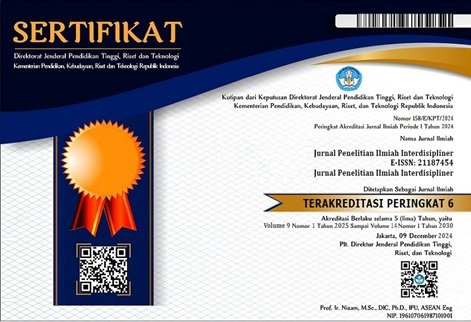PERAN IMPACT INVESTING, INOVASI SOSIAL, DAN KEBERLANJUTAN BISNIS DALAM MENINGKATKAN SOCIAL RETURN ON INVESTMENT PADA PROGRAM PENGELOLAAN LIMBAH BAHAN BERBAHAYA DAN BERACUN (B3) SEKTOR MANUFAKTUR SUB SEKTOR KIMIA DI BURSA EFEK INDONESIA PERIODE TAHUN 2020
Kata Kunci:
Impact Investing, Inovasi Sosial, Keberlanjutan Bisnis, SROIAbstrak
Penelitian ini bertujuan untuk menganalisis pengaruh impact investing, inovasi sosial, dan keberlanjutan bisnis terhadap peningkatan Social Return on Investment (SROI) dalam program pengelolaan limbah Bahan Berbahaya dan Beracun (B3) pada perusahaan sektor manufaktur subsektor kimia yang terdaftar di Bursa Efek Indonesia (BEI) periode 2020–2024. Metode penelitian yang digunakan adalah pendekatan kuantitatif dengan data sekunder dari laporan keberlanjutan dan laporan tahunan perusahaan. Variabel impact investing diukur melalui volume limbah dan emisi gas rumah kaca (GRK), inovasi sosial diukur melalui jumlah penerima manfaat dan tingkat partisipasi komunitas, sedangkan keberlanjutan bisnis diukur melalui Environmental, Social, and Governance (ESG rating). Hasil penelitian menunjukkan bahwa ketiga variabel independen secara simultan dan parsial berpengaruh terhadap rasio SROI. Perusahaan dengan pengelolaan limbah yang baik, partisipasi sosial yang aktif, dan praktik keberlanjutan yang konsisten mampu menghasilkan nilai sosial yang lebih tinggi dibanding investasi yang dilakukan. Temuan ini mendukung pendekatan stakeholder dalam teori keberlanjutan dan menunjukkan bahwa keberhasilan investasi sosial tidak hanya diukur dari keuntungan finansial, tetapi juga dari nilai sosial dan lingkungan yang tercipta.
This study aims to analyze the influence of impact investing, social innovation, and business sustainability on the improvement of Social Return on Investment (SROI) in hazardous and toxic waste (B3) management programs within the chemical manufacturing subsector companies listed on the Indonesia Stock Exchange (IDX) during the 2020–2024 period. The research method used is a quantitative approach with secondary data obtained from corporate sustainability and annual reports. The impact investing variable is measured through waste volume and greenhouse gas (GHG) emissions; social innovation is measured by the number of beneficiaries and the level of community participation; and business sustainability is measured through Environmental, Social, and Governance (ESG) ratings. The results indicate that all three independent variables simultaneously and partially influence the SROI ratio. Companies with effective waste management, active community engagement, and consistent sustainability practices are able to generate greater social value relative to the investment made. These findings support the stakeholder approach within sustainability theory and demonstrate that the success of social investments is not solely measured by financial returns, but also by the social and environmental value created.





